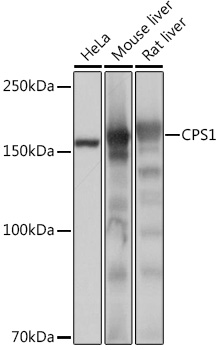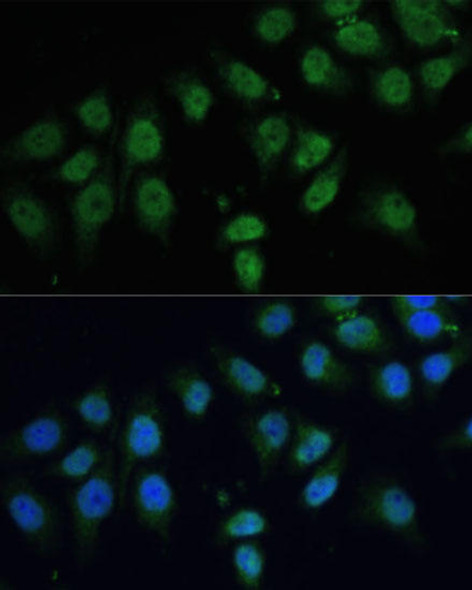Metabolism Antibodies 3
Anti-CPS1 Antibody (CAB4214)
- SKU:
- CAB4214
- Product Type:
- Antibody
- Reactivity:
- Human
- Reactivity:
- Mouse
- Reactivity:
- Rat
- Host Species:
- Rabbit
- Isotype:
- IgG
- Research Area:
- Metabolism
Description
| Antibody Name: | Anti-CPS1 Antibody |
| Antibody SKU: | CAB4214 |
| Antibody Size: | 20uL, 50uL, 100uL |
| Application: | WB IHC IF |
| Reactivity: | Human, Mouse, Rat |
| Host Species: | Rabbit |
| Immunogen: | A synthesized peptide derived from human CPS1 |
| Application: | WB IHC IF |
| Recommended Dilution: | WB 1:500 - 1:2000 IHC 1:50 - 1:200 IF 1:50 - 1:200 |
| Reactivity: | Human, Mouse, Rat |
| Positive Samples: | HeLa, Mouse liver, Rat liver |
| Immunogen: | A synthesized peptide derived from human CPS1 |
| Purification Method: | Affinity purification |
| Storage Buffer: | Store at -20'C. Avoid freeze / thaw cycles. Buffer: PBS with 0.02% sodium azide, 0.05% BSA, 50% glycerol, pH7.3. |
| Isotype: | IgG |
| Sequence: | Email for sequence |
| Gene ID: | 1373 |
| Uniprot: | P31327 |
| Cellular Location: | |
| Calculated MW: | 150kDa |
| Observed MW: | 160KDa |
| Synonyms: | CPSASE1, PHN |
| Background: | The mitochondrial enzyme encoded by this gene catalyzes synthesis of carbamoyl phosphate from ammonia and bicarbonate. This reaction is the first committed step of the urea cycle, which is important in the removal of excess urea from cells. The encoded protein may also represent a core mitochondrial nucleoid protein. Three transcript variants encoding different isoforms have been found for this gene. The shortest isoform may not be localized to the mitochondrion. Mutations in this gene have been associated with carbamoyl phosphate synthetase deficiency, susceptibility to persistent pulmonary hypertension, and susceptibility to venoocclusive disease after bone marrow transplantation.[provided by RefSeq, May 2010] |
| UniProt Protein Function: | CPS1: Involved in the urea cycle of ureotelic animals where the enzyme plays an important role in removing excess ammonia from the cell. Defects in CPS1 are the cause of carbamoyl phosphate synthetase 1 deficiency (CPS1D). CPS1D is an autosomal recessive disorder of the urea cycle causing hyperammonemia. Clinical features include protein intolerance, intermittent ataxia, seizures, lethargy, developmental delay and mental retardation. Genetic variations in CPS1 influence the availability of precursors for nitric oxide (NO) synthesis and play a role in clinical situations where endogenous NO production is critically important, such as neonatal pulmonary hypertension, increased pulmonary artery pressure following surgical repair of congenital heart defects or hepatovenocclusive disease following bone marrow transplantation. Infants with neonatal pulmonary hypertension homozygous for Thr-1406 have lower L-arginine concentrations than neonates homozygous for Asn-1406. 2 isoforms of the human protein are produced by alternative splicing. |
| UniProt Protein Details: | Protein type:Amino Acid Metabolism - arginine and proline; Nucleolus; Amino Acid Metabolism - alanine, aspartate and glutamate; Ligase; Mitochondrial; Energy Metabolism - nitrogen; EC 6.3.4.16 Chromosomal Location of Human Ortholog: 2q35 Cellular Component: mitochondrial matrix Molecular Function:aspartate carbamoyltransferase activity; carbamoyl-phosphate synthase (ammonia) activity; carbamoyl-phosphate synthase (glutamine-hydrolyzing) activity; dihydroorotase activity; protein binding Biological Process: 'de novo' pyrimidine base biosynthetic process; arginine biosynthetic process; glycogen catabolic process; homocysteine metabolic process; nitric oxide metabolic process; positive regulation of vasodilation; response to lipopolysaccharide; triacylglycerol catabolic process; urea cycle Disease: Carbamoyl Phosphate Synthetase I Deficiency, Hyperammonemia Due To; Pulmonary Hypertension, Neonatal, Susceptibility To |
| NCBI Summary: | The mitochondrial enzyme encoded by this gene catalyzes synthesis of carbamoyl phosphate from ammonia and bicarbonate. This reaction is the first committed step of the urea cycle, which is important in the removal of excess urea from cells. The encoded protein may also represent a core mitochondrial nucleoid protein. Three transcript variants encoding different isoforms have been found for this gene. The shortest isoform may not be localized to the mitochondrion. Mutations in this gene have been associated with carbamoyl phosphate synthetase deficiency, susceptibility to persistent pulmonary hypertension, and susceptibility to venoocclusive disease after bone marrow transplantation.[provided by RefSeq, May 2010] |
| UniProt Code: | P31327 |
| NCBI GenInfo Identifier: | 4033707 |
| NCBI Gene ID: | 1373 |
| NCBI Accession: | P31327.2 |
| UniProt Secondary Accession: | P31327,O43774, Q53TL5, Q59HF8, Q7Z5I5, B7Z818, J3KQL0 |
| UniProt Related Accession: | P31327 |
| Molecular Weight: | 165,650 Da |
| NCBI Full Name: | Carbamoyl-phosphate synthase |
| NCBI Synonym Full Names: | carbamoyl-phosphate synthase 1 |
| NCBI Official Symbol: | CPS1 |
| NCBI Official Synonym Symbols: | PHN; CPSASE1 |
| NCBI Protein Information: | carbamoyl-phosphate synthase [ammonia], mitochondrial |
| UniProt Protein Name: | Carbamoyl-phosphate synthase [ammonia], mitochondrial |
| UniProt Synonym Protein Names: | Carbamoyl-phosphate synthetase I; CPSase I |
| Protein Family: | Carboxypeptidase |
| UniProt Gene Name: | CPS1 |
| UniProt Entry Name: | CPSM_HUMAN |







